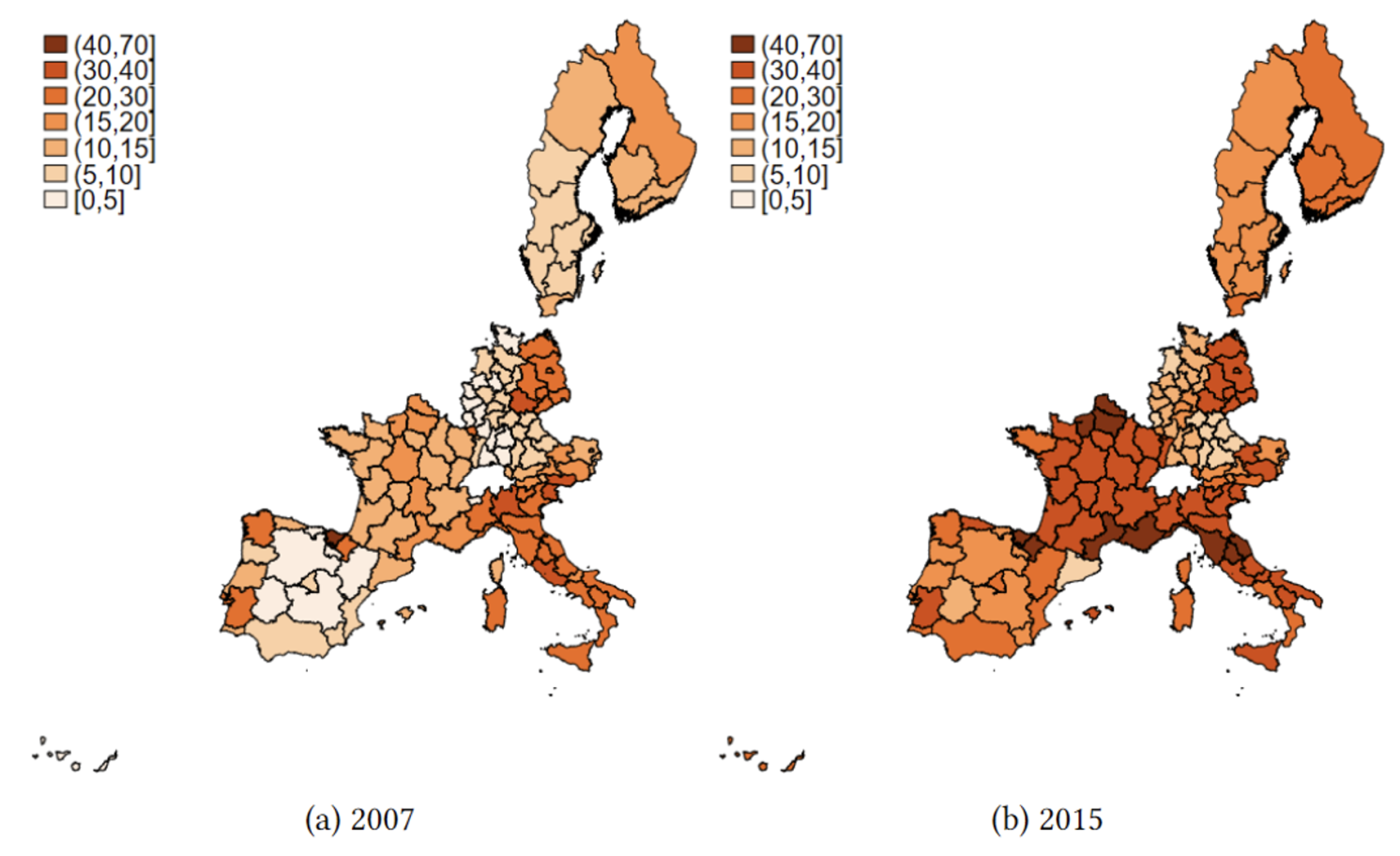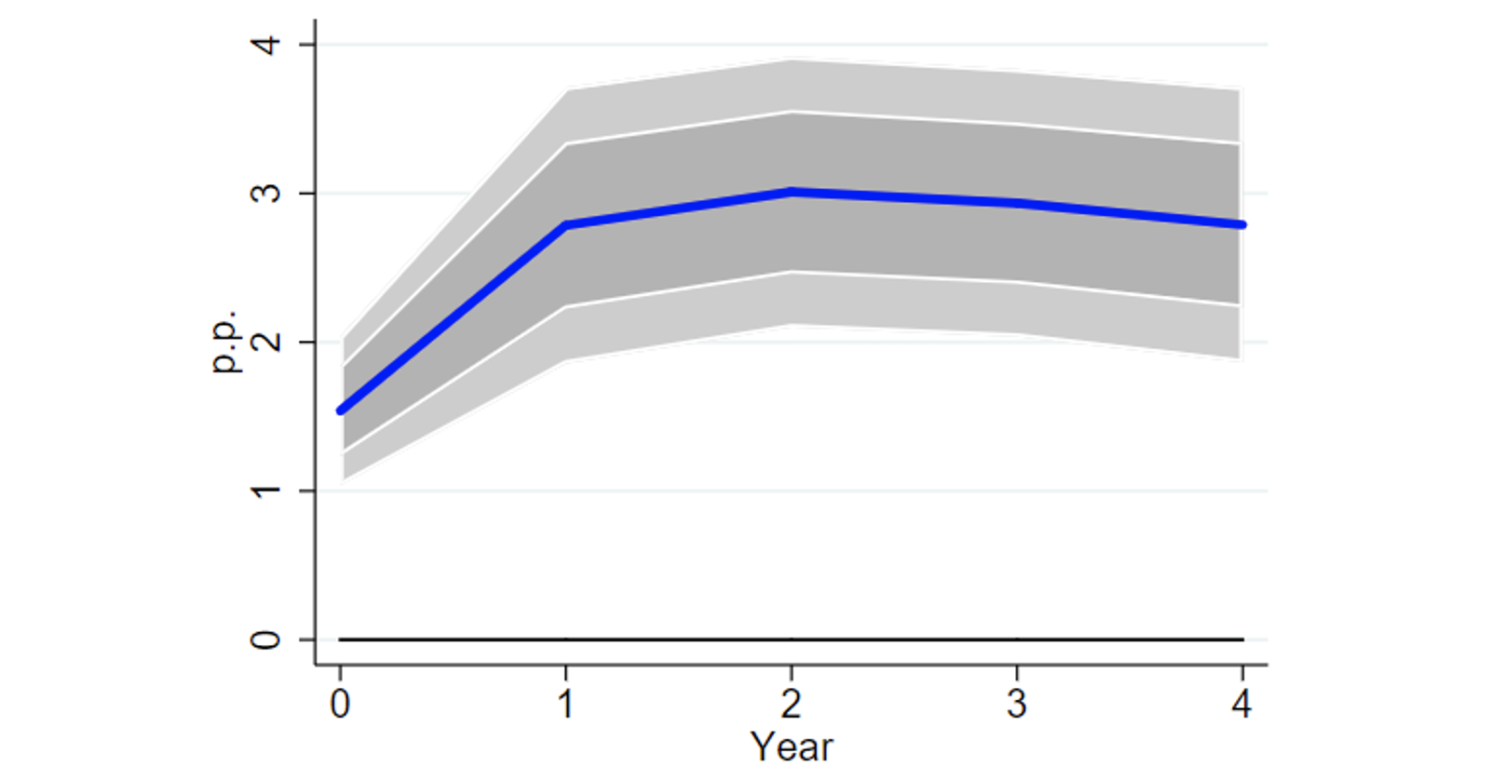Yves here. This post provides some official confirmation for the common-sense observation, that austerity, aks squeezing the middle class and the poors, produces distrust of government and radicalization.
By Mathias Klein, Senior Economist Sveriges Riksbank, Ana Sofia Pessoa, PhD candidate University of Bonn, and Ricardo Duque Gabriel,PhD candidate in Economics University of Bonn. Originally published at VoxEU
In the last decades, populist parties have gained massive support. At the same time, many countries have implemented large-scale fiscal consolidations to avert the risk of sovereign default. This column provides new evidence on the political consequences of austerity using a novel regional database covering over 200 elections in several European countries. Results show fiscal consolidations lead to a significant increase in the vote shares of extreme parties, lower voter turnout, and a rise in political fragmentation. Austerity-driven recessions amplify the political costs of economic downturns considerably by increasing distrust in the political environment.
Anti-establishment and populist parties have gained significant support since the Great Recession in many advanced economies around the world (Guiso et al. 2017, Rodrik 2017). Higher vote shares for these parties have increased partisan conflict and led to more fragmented parliaments. The resultant polarised political environment is generally associated with higher policy uncertainty and lower economic growth (Schiantarelli et al. 2020, Schularick et al. 2021).
The rise in support for extreme parties occurred in a period of significant fiscal policy interventions. Several European countries have implemented large-scale fiscal consolidation measures to reduce high levels of public debt. The massive reductions in public spending faced significant opposition and resulted in anti-austerity movements. In a recent paper, we investigate the link between fiscal consolidations and rising polarisation and provide new evidence on the political costs of fiscal austerity (Gabriel et al. 2022).
To this end, we assemble a novel regional dataset on election outcomes that provides detailed voting results on regional, national, and European elections. Our final dataset covers 124 European regions from eight countries and spans from 1980 to 2015. We collect data on more than 200 elections, with roughly 20 elections per region and, on average, one election every two years.
Austerity Increases Political Polarisation
Figure 1 gives a first impression of the regional election data. It shows the regional vote shares for extreme parties for the regions in the sample for the years 2007 and 2015, just before the start of the Great Recession and after the height of the Sovereign Debt Crisis. The figure shows that more extreme voting in the recent past is a shared phenomenon across countries and regions. Particularly strong increases in the vote shares of extreme parties can be observed for regions in France, Spain, and Italy. However, there are also significant differences across regions within the same country. For example, while regions in the western and southern parts of Germany show lower vote shares for extreme parties, voters in the eastern part favour extreme parties more strongly.
Figure 1 Regional vote shares on extreme parties in 2007 and 2015

Notes: Figures 1a and 1b depict, in per cent, the sum of the far-left and far-right vote shares for European regions at the NUTS 2 level in 2007 and 2015, respectively. If elections do not take place in these specific years, the map shows the outcome from the previous ballot.
To test the causal relationship between fiscal austerity and voting outcomes, we identify exogenous changes in national government expenditures motivated by a desire to reduce budget deficits in response to past decisions. We then combine them with regional sensitivities to fiscal spending to account for the fact that regions that rely heavily on public spending are likely to be more affected by national government austerity measures.
Figure 2 presents the response of extreme parties’ vote share to fiscal consolidation. A 1% reduction in regional public spending leads to an increase in extreme parties’ vote share of around three percentage points. Our results suggest that around 10% of the variation in extreme parties’ vote share is indeed due to fiscal consolidations, which further highlights the importance of austerity in understanding shifts in voters’ preferences toward the more extreme ends of the political spectrum.
Figure 2 Response of extreme parties’ vote share to austerity

Notes: The figure plots the impulse response in percentage points of the vote share for the extreme parties to an austerity-induced change in government spending by 1%. Bands are 68% (dark) and 90% (light) confidence intervals.
We also show that the higher vote share captured by extreme parties can be explained by a fall in voter turnout together with an increase in the total votes for these parties. Thus, fewer people vote in response to fiscal consolidations and those who do exhibit a higher tendency to vote for extreme parties. In addition, austerity increases fragmentation, which suggests that austerity affects economic outcomes through a more polarised political environment.
Austerity Is Economically Costly and Increases Distrust in the Government
To rationalise our main findings on the political consequences of austerity, we also estimate the economic effects of fiscal consolidations at the regional level. Austerity leads to a significant fall in regional output, employment, investment, durable consumption, and wages. Furthermore, the reduction in public spending lowers the labour income share, thereby inducing income redistribution away from working households. These findings highlight the close relationship between detrimental economic developments and voters’ support for extreme parties following fiscal consolidations.
Ultimately, we examine whether austerity-driven recessions yield different political outcomes than general economic downturns. We differentiate between recessions that coincide with fiscal consolidations (‘austerity recessions’) and those not related to austerity (‘non-austerity recessions’) and estimate the response of extreme parties’ vote share in both episodes of economic slack. Our estimates imply that austerity recessions lead to a significantly larger increase in the vote share for extreme parties than other recessions.
We relate this result to a potential trust channel of fiscal consolidations by showing that people’s trust in the government deteriorates much more during austerity recessions compared to non-austerity recessions. This might point toward a ‘doom loop’ between distrust in the political system and more extreme voting following fiscal consolidations. In sum, austerity-driven recessions are special in the sense that they considerably amplify the political costs of economic downturns by creating more distrust in the political environment.
See original post for references


I wonder why the authors use the word consolidation as an equivalent to austerity. To consolidate is to strengthen or combine.
I apologize; their primary language seems not to be English.
Proofreading note (burn after reading): in the intro you’ve got aks instead of aka.
so not also kinda sucky? ;)
This merely shows how clever the U$ political system, of only permitting the two wings of the War and Money Party to exist, with no other parties allowed, actually is.
Those parties, providing the ONLY “effective” choices possible, ensure that “more of the same” is the only possible outcome of voting, as each and every vote legitimizes that outcome.
U$ Democracy is great.
Isn’t it?
Those silly Europeans.
It is obviously a good thing, then, that the U$; rules the world, given the selfish fickleness of our European vassals, as I am certain you must all agree.
Democracy or Dictatordship by the Blob?
There is no genuine democracy, here, nor ever has been, synoia.
My comment was total snark.
I had added a further “reply”, which the ether ate, apparently, where I pointed out that the Tarcomeds and Nacilbupers, the two wings of the War and Money partay have, since the days of the Whigs (who today, might call themselves “Merkins”), turned even pretend “democracy” backwards, into inverted totalitarian austerity and neocon dreams of Full Spectrum Dominance.
My observation is that the “rise of extremist parties” is a very manageable problem for the elite. Of course, voting systems like in USA or UK make it easier, electoral futility keeps “extreme parties” tiny. But otherwise three approaches work “well”.
Eroding “extreme parties” so at the end of the day they are indistinguishable fro the “traditional”. Prime example are German Greens.
Having “extremes” neutralizing themselves by mutual hatred. Think France.
Disposable parties “replacing” the traditional parties. France, Italy. Empty slogans, meteoric rise, deflation or collapse, another party rise meteorically (or a few).
In short, austerity has a very effective elite backing, and “extremism” is managed.
Needless to mention, decrease in voting participation is also a “feature”, not a cause for the elite to worry.
PS. I guess I could use “the ruling class” instead of “elite”, I am weak in political theory.
I would love to read a serious history of the Green parties. Twenty years ago I worked for the England/Wales and Scottish Greens. I found them smart and inspirational. Today the English Greens have foundered into idpol irrelevance, while the German Greens seem to have gone full N*zi.
Regarding austerity, I read in NC years ago that it was New Labour and Tory austerity policies that brought us Brexit.
Common-sense observation: Austerity is unevenly applied. Those inflicting seem to escape their handiwork, in the short run.
In the long run, this understanding may well come to be generally understood.
However, as has been pointed out, there is a downside TO the “long run”.
And, in the meantime, and it will likely be a very mean time for the many, things will just go from bad to worse.
Of course, the many will be set against each other and any unpleasant outcomes will be blamed on fickle fate and the unconscionable restrictions on Mr. market caused by outrageous labor demands for obscenely higher wages.
Proving, once again, if doubts remain, that the many are responsible for their own plight.
“Austerity the history of a dangerous idea” by Mark Blyth explained simply and concisely
You can read the book, but for a quick summary there is this:
https://www.amazon.com/Austerity-History-Dangerous-Mark-Blyth/dp/0199389446
Austerity for thee, Not for the blob.
Perhaps a radicalised body politic could be a good thing?
Poor governance over an extended period has failed the middle, so the extremes flourish. Simple.
The rise of the alleged extreme parties is, as everyone knows, a reaction to the extremism of the established parties. It is not an equal and opposite reaction because the voters do not have a veto ballot that would negate the corrupt acts of the legislative, executive and judicial branches.
This may seem extreme to those who don’t believe in democratic government. The existence of a veto ballot and criminalizing campaign contributions would significantly reduce corruption of the representative principle and the class bias of the rich presented as economics.